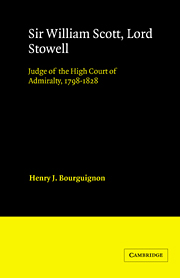Book contents
- Frontmatter
- Contents
- Preface
- List of abbreviations
- 1 Survey of English admiralty jurisdiction: how did it vanish?
- 2 Sir William Scott – a biographical sketch
- 3 The law of the instance court
- 4 Prize law: nationality – a study in detail
- 5 Prize law – a survey
- 6 Scott's judicial philosophy
- 7 Scott's influence
- Appendix: the Stowell notebooks
- Bibliography of primary sources
- Index
- CAMBRIDGE STUDIES IN ENGLISH LEGAL HISTORY
- Frontmatter
- Contents
- Preface
- List of abbreviations
- 1 Survey of English admiralty jurisdiction: how did it vanish?
- 2 Sir William Scott – a biographical sketch
- 3 The law of the instance court
- 4 Prize law: nationality – a study in detail
- 5 Prize law – a survey
- 6 Scott's judicial philosophy
- 7 Scott's influence
- Appendix: the Stowell notebooks
- Bibliography of primary sources
- Index
- CAMBRIDGE STUDIES IN ENGLISH LEGAL HISTORY
Summary
Sir William Scott, Lord Stowell, has been considered a good, perhaps even a great, judge. As a civilian he practiced, not in the courts of common law, but in the courts which followed the civil law, like the admiralty court and the church courts. This book evaluates his work as judge of the admiralty court where he presided for thirty years. Although he also sat for more than thirty years as judge of the London Consistory Court, this aspect of his work is only briefly mentioned. I have, throughout the book, referred to him as Scott, since that is what he was called during most of his long life. He did not become Lord Stowell until near the end of his active career when he was seventy-five years old.
When I first began this project, I decided not to write a full-scale, judicial biography of Scott as judge of the admiralty court. During my year of research in Great Britain this decision was confirmed when I was unable to locate any substantial collection of Scott's letters, personal papers or legal books. The various scattered letters and papers I found shed considerable light on his work, but could not provide enough detailed information for a complete judicial biography.
Scott has left, however, an immensely valuable collection of admiralty court decisions, called judgments. The ten and a half volumes of Scott's reported judgments provide the focal point for this study. His fame as a judge and as the greatest of the civilians rests primarily on these well-crafted opinions. In preparing these decisions Scott drew upon his entire background and training, his years of study and legal practice.
- Type
- Chapter
- Information
- Sir William Scott, Lord StowellJudge of the High Court of Admiralty, 1798–1828, pp. ix - xiiPublisher: Cambridge University PressPrint publication year: 1987

